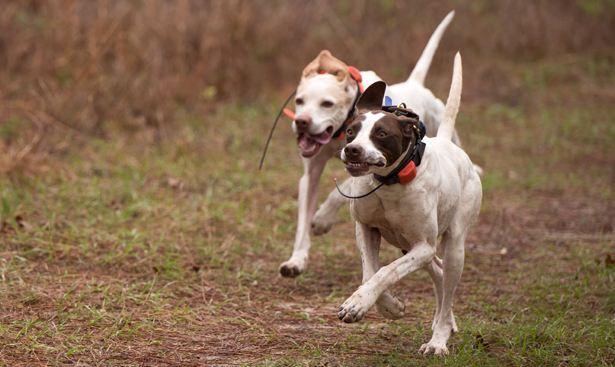As had become almost habitual, Ben Reach was a last-minute substitute for a reporter who failed to show. The stake was an end-of-season all-age qualifier being run on an iconic wild bird plantation near Albany. One of the announced judges had also flat rocked, and when on arriving at the plantation, Ben learned who the substitute judge was he almost claimed a health emergency to get out of his assignment.
The reason was not because the substitute judge was incompetent. Indeed he was experienced and consistent, paid attention, and rode his own good horses with skill. It was just that he and the other judge were complete opposites in what they looked for in an all-age performance.
The advertised judge who had kept his commitment, Bill, liked a handling front runner requiring little scouting with adequate range. The substitute judge, Harry, liked a Hell-for-Leather Don’t Look Back type that ran big all the time and to the extreme. “A real all-age dog has got to be scouted,” Ben had heard Harry say often. Ben had judged with both more than once and saw ahead conflict between them. And so it developed, in the oddest sort of way.
Farley Snead was relatively new on the all-age circuit, having moved over four years ago from AKC trials. This year he was having some success. He had in his string two half-qualified pointers, Georgia Gemstone, a female who consistently ran a race of the sort Bill liked, and Alabama Ace, a male of the sort Harry liked.
When the forty entries had run, each judge was certain about the winner. Unfortunately, they disagreed strongly on its identity. In fact, each man was initially unwilling to grant a placement to the other’s choice for first place.
Bill thought Gem had won it with her three-find unscouted hour during which she hunted the front and responded to Farley’s handling consistently at the end of her casts. Her race had not been huge, but Bill thought she had run enough.
Harry was equally convinced Alabama Ace should be placed first. He too had scored three finds, all distant though somewhat lateral (Bill said out of bounds). Bill also criticized Ace’s race for requiring considerable scouting (twice Farley had been required to send his scout to get Ace back to the front).
When they could not agree, Bill and Harry sought Ben’s advice on solving the dilemma.
“Well, you could flip a coin. Or you could have a call back,” Ben said.
“How the hell can we have a call back when Farley handles both dogs?” Harry asked.
“Run them as bye dogs,” Ben said.
And so they did.
“ We are going to watch each dog thirty minutes, then give you a decision,” Bill said.
“Do you mean one will get first, the other second?” Farley asked.
Bill and Harry looked at one another. They had not yet considered that, much less decided it.
“We will let you know later,” Harry said.
They should have flipped a coin, Ben thought.
Farley ran Gem and Ace one after the other. Each had one find and the same sort of race as in the regular running. Neither judge was moved in his opinion.
Again they consulted Ben. “Flip a coin,” Ben said again.
Bill and Harry conferred privately again, then went to Farley, taking Ben as a witness.
“We are going to let you pick which of Gem and Ace wins, the other will not place,” Bill said.
The inmates are running the asylum, Ben thought.
“Let me talk with my owners,” Farley said.
Farley’s owners were very different men, just as their dogs were different. Gem was owned by a young rich heir to Old Money, not from one source but several. Tobacco from his mother’s side, whiskey and whisky from his father’s (bourbon from Kentucky, Scotch from Scotland). Ace’s owner was a cotton and cattle farmer Ben’s age.
The young heir became highly excited, then angry, when Farley told him of the judges’ edict. The farmer became amused. He had endured enough of the slings and arrows of outrageous fortune to see what a ridiculous position the judges had got themselves into.
“Here is what I say we do. We tell the judges to let Ben Reach flip a coin. The winner gets first, the other of Gem and Ace gets second. I understand how men can have different ideas about an ideal race but it makes no sense not to compromise on second place when one of two supposedly competent judges thinks the other of our dogs should have first. And we let Ben know to tell these damned judges if they do not agree we will tell everybody we know what has happened here and they will be the laughing stock of field trials.”
Farley took this message to Ben, who conveyed it to Bill and Harry. The coin was tossed, Ace won it and got first, Gem got second. When Ace ran in the National Championship he was declared gone too long at two hours. Ben saw the irony in that, and called the farmer-owner, an old friend, to express condolences.
“Thanks, Mr. Ben, but as we know that’s field trialing. And of course Ace is a Free-For-All type and the kind I like even if he cannot win at Grand Junction.”
NOTE: Credit for this plot belongs to Luke Weaver.

I personally like Ace the Free for All type, however, a really good All Age dog will adjust his range to the conditions and courses.These major trials should always be run strictly on wild bird only courses to recognize the true quality of our dogs.
I like the front running dog. If you have to send a scout so be it. If the dog can make the moves and keep showing to the front. Throw in a couple finds and you have a winner.